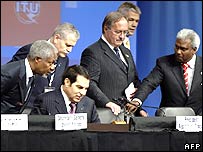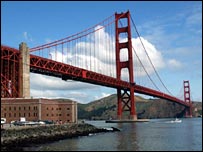|

by Elizabeth Biddlecombe
17 November 2005
from
BBC Website

World leaders
are in Tunis
to discuss the net and development
Changes brought about by the internet will be dwarfed by those
prompted by the networking of everyday objects, says a report by a
UN body.
The study looks at how the use of electronic tags and
sensors could create an "internet of things". The report by the
International Telecommunications Union was released at the UN
net summit in Tunis.
Thousands of delegates are discussing ways of narrowing the
technology gap between rich and poor.
"It would seem that science fiction
is slowly turning into science fact in an 'Internet of Things'
based on ubiquitous network connectivity," said the report.
"Today, in the 2000s, we are heading into a new era of ubiquity,
where the 'users' of the internet will be counted in billions
and where humans may become the minority as generators and
receivers of traffic."
Global
involvement
Radio Frequency Identification (RFID),
sensors, robotics and nanotechnology will make processing power
increasingly available in smaller and smaller packages so that
networked computing dissolves into the fabric of things around us.

Golden Gate Bridge
Sensors check San Francisco's
famous landmark for damage
The result could mean remote controls embedded in clothing, cars
that alert their driver when they have developed a fault, managers
who check on workers through the RFID devices embedded in their
phones, and bags that remind their owners that they have forgotten
something.
There are already examples of the technology in action. Tiny sensors
are used to check San Francisco's Golden Gate Bridge for
structural damage and in coffee beans in Brazil for quality control.
Some of the benefits of this ubiquitous networked society include
cheaper HIV treatments, more effective pharmaceutical controls and
the purification of water using
nano-filters.
Wealth
creation
Unlike previous technological revolutions, some developing countries
are already heavily involved in generating the science and products
around these items.
"The traditional dominance of
industrialized countries in scientific and technological
innovations will weaken, in favor of less wealthy but no less
tech-savvy nations," said the ITU report.
Things like privacy
protection
should become part of the design itself
of
the technology,
even before it makes it to market
Lara Srivastava
ITU
Entitled
The Internet of Things, the
study said that the demands of multi-national businesses are forcing
countries to adopt the new technology.
For example, the request by American retail giant Wal-Mart that its
top suppliers use RFID tags has prompted Chinese manufacturers to
adopt the technology.
The so-called Internet of Things is
predicted to offer new business opportunities for all, from
manufacturers to the telecoms industry, and create entirely new
markets.
But it cold also have negative impacts, such as increased levels of
electro-magnetic radiation generated by a world of communicating
objects.
Everything
monitored?
The ITU report cautions that the needs and wishes of human being
must be kept central to all these endeavors and the public must be
educated about their implications.
"Money talks, that's clear," said
Lara Srivastava, of the Strategy and Policy Unit at the ITU.
"However we can make it talk less loudly if we put forward some
of these issues early on.
"Things like privacy protection should become part of the design
itself of the technology, even before it makes it to market."
To this end, governments, the private
sector and other agencies must act from the outset to safeguard
principles of informed consent, data confidentiality and security,
according to the report.
"Society will have to deal with some
very substantial issues," said Jonathan Murray, Chief Technology
Officer for Microsoft Europe.
"The rapid transition created by the network effect do not
increase the digital divide."
Concerns about RFID technology have
already led to consumer boycotts. In addition, the lack of technical
standards for the component technologies could hinder its evolution.
But while it is hard to say to what extent it will develop, the past
gives us a hint of the future, according to Ms Lara Srivastava.
"It's safe to say that technology
today is more pervasive than we would ever have imagined
possible 10 years ago," she said. "Similarly, 10 years from now
things will continue in this general direction. That's what
these new technologies are telling us."
|



